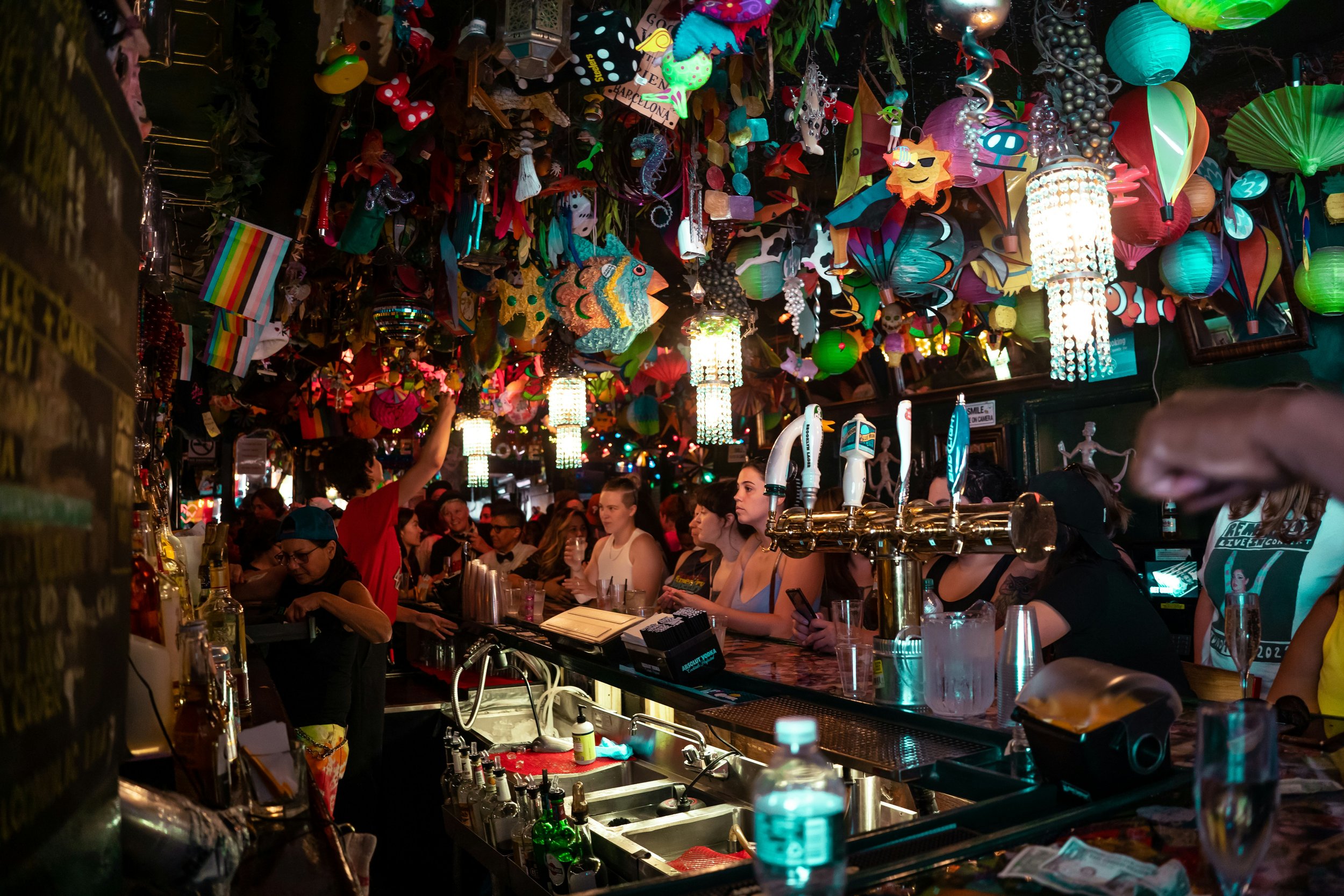A deep-dive into London’s lesbian scene, from The Gateways to La Camionera
All the Sapphic-friendly venues in the Smoke seem to be disappearing, from groundbreaking feminist bookshops to Bruno Mars-playing Soho clubs. Will a sexy Spanish tapas bar (fresh from the success of its viral opening) save the day? Dani Clarke finds out.
I’m in Dalston Superstore on a Saturday night, and the room is heaving. Calling it a room is generous; the upstairs area is more of a narrow hallway flanked by a wall of sexually explicit posters on one side and the bar on the other, with a few tables at the front and coat check at the back. There is a similarly sized dance area downstairs, but we don’t fancy pulsating to wordless, bass-heavy songs in a dark underground chamber tonight, so upstairs it is.
The place is lit up in neon pinks, with gay porn projected onto the ceiling, and a performer in a bejewelled denim bikini is dancing atop the bar next to the DJ. I look up, jealously, at all the space they seem to be enjoying. Down here on the dancefloor you can barely move, let alone get to the bar or toilet. And that is because, dear reader, the room is packed with gays. Gays who have nowhere else to go.
Let me set the scene for you. Late last year, the nightclub G-A-Y Late closed for good; the most recent in a bout of gay bar closures, with more than half of London's LGBTQ+ venues shutting their doors between 2006 and 2022. While it’s well-documented that the nightlife scene has been struggling in general, due to challenges like Covid-19 and the cost-of-living crisis, one of the biggest casualties has been the queer community — and particularly queer women. As of right now, there is only one permanent lesbian bar in England’s capital city: She in Soho.
Once upon a time, London lesbians had The Gateways. The iconic nightclub opened in Chelsea in 1931 and became a midcentury hotspot for queer women who flocked from all over the UK. It lost popularity in the 1980s as gay discos came into fashion, and closed in 1985, making it the longest running lesbian club in world history.
Meanwhile Sisterwrite, Britain’s first feminist bookshop, opened in Islington in 1978 and became a central daytime hub of the local lesbian community. That eventually closed too, however, in 1993. No similar bookshop has ever really filled its place since, due to the decline of second-wave feminism and the ever-increasing difficulty for independent bookstores to survive (thanks a lot, Jeff Bezos).
So, back to the present; to the slightly depressing state of affairs we find ourselves in, and a lack of places to go on a good old gay outing, night or day. And then, quite suddenly, enter the beacon of hope that is La Camionera.
It’s likely that you’ve already heard of La Camionera. Maybe you read that mysterious ES magazine profile on the formerly anonymous founder, Alex Loveless. Or, perhaps, you’ve seen the photos and videos from opening night that captured hundreds of Sapphics filling the streets of Hackney. The bar’s patrons – all of those who couldn’t fit into the sardine-can basement venue – spilled out into the night and across Broadway Market, like some kind of serendipitous carabiner-wearer convention.
Alex and his partner Clara decided to set up La Camionera as an alternative to extortionate club night spots – where the food and drinks are tasty and decently priced, with a laidback, European vibe. Indeed, ‘La Camionera’ translates to ‘the female truck driver’, and is used as a Spanish slang term for butch lesbians.
As you might expect from the enigmatic founder of the hottest new queer bar in town, Alex is a trans masc of few words. When I asked why he decided to open a lesbian bar specifically, he said simply: “Because most of my friends are lesbians.”
“Everywhere is a bit flat, a bit bleak, at the moment,” Alex continued, referring to the state of LGBTQ+ nightlife in London. “People don’t go out much and for good reason. I hope [the city’s queer scene] moves into other spaces, too, that aren’t necessarily tied to late-night clubs.”
After setting up a fundraiser page to secure donations for their next step – opening an above-ground cafe/cervecería – Alex and Clara have now raised over £50,000. As part of the scheme, patrons could help out by paying £5 in advance and collecting a pint when the place reopens later this March.
“It’s especially important to have queer and trans friendly spaces in the UK, especially as most spaces for subcultures have moved online.”
The sudden, considerable success of a bar which, as of right now, isn’t yet open could be attributed to a number of factors: the artsy Instagram marketing, the viral-TikTok potential of that Thursday night in Hackney, or the fact it just sounds like a really, really cool bar. It’s the exact kind of bar many Londoners will wish was their local, so they could use it as a regular haunt to take Hinge dates they’re aiming to impress via an extensive knowledge of natural wines and small-plate chalkboard menus.
And yet, beyond all of these compelling factors, the one I keep coming back to is the message Alex and Clara added at the end of their fundraiser description: “We will be the first FLINTA-owned LGBT+ space in London for over a decade”. (FLINTA is an abbreviation that stands for female, lesbian, intersex, non-binary, trans and agender people.)
Isn’t it unbelievable, in a supposedly progressive city like London, with the highest proportion of gay people out of anywhere in the UK, that there are no other spaces like this?! Maybe not, given the country’s recent political climate, and some gay news that broke only a few weeks ago. It was reported that another lesbian bar is opening later this year (I know, you wait ages for a bus… etc).
But this one has issued a very different mission statement to La Camionera, and elicited a far cooler reception from the queer community. The bar, known as L Community, has been referred to by the founder as a “members’ club” for “biological females”, causing London’s LGBTQ+ community to already begin rallying against it as a trans-exclusionary space.
On various social media platforms, queer Brits complain about how disappointing (and suspicious) it is that a place with such a transphobic message somehow has the financial backing to open while inclusive spaces drop like flies across the country. Although it’s too much pressure to put on one little bar to expect La Camionera to swoop in and provide shelter to all the trans-inclusive Sapphics, it is heartening that the founders are so set on contributing towards a more accepting culture.
“It’s especially important to have queer and trans friendly spaces in the UK,” Alex tells me. “Especially as most spaces for subcultures have moved online.”
He’s right. La Camionera's charm lies in that promise of offline community-building: swathes of lesbians and non-binary people from every corner of the city meeting up for after-work drinks and morning-coffee debriefs; friend groups gathering and girlfriends celebrating anniversaries; strangers mingling at supper clubs and indie book-launch events.
“There’s an ever-growing and evolving lesbian community, whose growth is not mirrored by an influx of queer spaces; a fact that queer Londoners have been talking about for decades”
This desire for lesbian interactions beyond online spaces is something Instagram user @quirked.up.hackney.lesbian is all too familiar with, as the owner of a niche meme account aimed at queer women in east London. “I would describe the London lesbian scene as: ready and waiting with open arms for good shit to happen,” they tell me.
“There are loads of small dyke nights, especially in south-east London, but none of them have a queer/lesbian-run venue as a base,” they continue. “There are some amazing nights in south-east London like ‘Switch Rising’, ‘Testo Hunkie’ and ‘Wet’. There’s ‘Sex and Rage’ and a new night called ‘Leztopia’ in east too.
“I love the ‘Pop Up Dyke Bar’ events the most, which happen all across London, I know they really care about making accessible and affordable nights. It’s disappointing that there aren’t more queer venues, but the small nights are persevering.”
The reality is that London lesbians have created their own cultural touchstones and assembly points, as queer people have always done, organising alternative events that you have to be on the inside to know about. If you’re looking for them, you’ll probably find a range of options, from queer raves and sex parties to Sapphic book clubs and charity-run events. Yet the feeling persists: in an age like this, we shouldn’t still be hiding in impermanent, shadowy, secret spaces.
The overwhelming reaction to La Camionera helps reflect this contrast. There’s an ever-growing and evolving lesbian community, whose growth is not mirrored by an influx of queer spaces; a fact that queer Londoners have been talking about for decades but society at large seems to only be catching onto now.
Read more: Where are all the UK’s late night spaces?
The fact that, by the end of this year, there might be three lesbian bars in the entirety of London, one of which is transexclusionary and one being a coffin-sized bunker that plays WAP, is certainly indicative that we are living through an era. An era that prompts existential, zeitgeisty questions such as: who is trying to keep all the lesbians underground in basements and bunkers and secret raves and scary Terf dungeons? Even the iconic Gateways, back in the day, was located in a smoky, windowless cellar. Isn’t it time we stepped out into the light?
Back in Dalston Superstore (remember me?), I’m afraid to tell you that my girlfriend and I are engaging in some PDA. When we break away to scan for pervy, ogling homophobes, I see none. Instead, I notice we are surrounded by three other Sapphic couples, all locked in various states of embrace. “Look,” I whisper to my girlfriend, “they’re gay.” She looks at me sagely and says, “Dani, everyone here is gay.”
Firmly above ground, in the upstairs area of a venue where you literally cannot move for queers, it seems I’m not the only one tired of dark, sunken rooms.
And it also seems that, sometimes, lesbian prayers are answered. Alex makes it clear in his fundraiser description for La Camionera that the new, permanent location for the bar will feature high ceilings and windows to let in the light. In short, he writes: “no more basements!”


